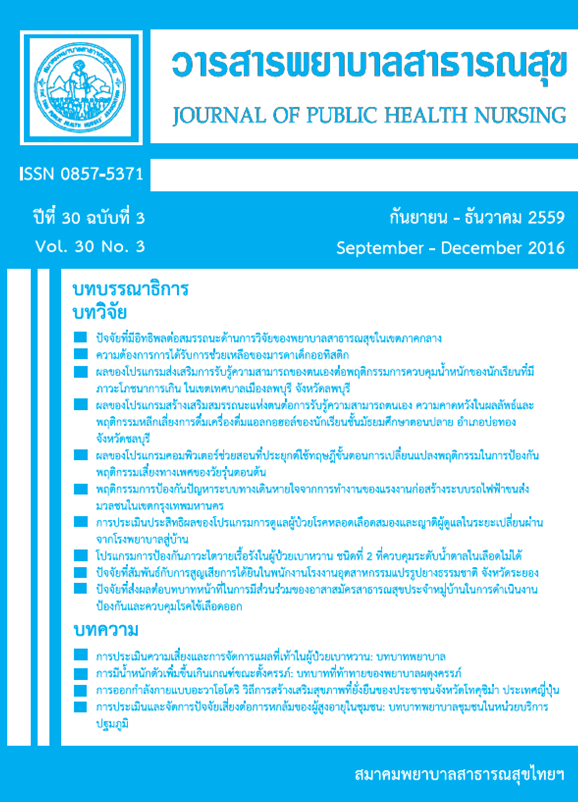โปรแกรมการป้องกันภาวะไตวายเรื้อรังในผู้ป่วยเบาหวาน ชนิดที่ 2 ที่ควบคุมระดับน้ำตาลในเลือดไม่ได้
Abstract
การวิจัยกึ่งทดลองนี้ มีวัตถุประสงค์เพื่อศึกษาผลของโปรแกรมการป้องกันภาวะไตวายเรื้อรัง ในผู้ป่วยเบาหวานชนิดที่ 2 ที่ควบคุมระดับน้ำตาลในเลือดไม่ได้ โดยประยุกต์ทฤษฎีใช้แรงจูงใจในการป้องกันโรคร่วมกับแนวคิดแรงสนับสนุนทางสังคม กลุ่มตัวอย่างคือ ผู้ป่วยอายุ 40-60 ปี ที่มาตรวจรักษาที่คลินิกเบาหวาน โรงพยาบาลสิรินธร จังหวัดอุบลราชธานี จำนวน 60 คน แบ่งเป็นกลุ่มทดลองและกลุ่มเปรียบเทียบ กลุ่มละ 30 คน ระยะเวลาศึกษา 6 สัปดาห์ เป็นระยะทดลอง 2 สัปดาห์ และระยะติดตามผล 4 สัปดาห์ เก็บรวบรวมข้อมูลด้วยแบบสอบถามในระยะก่อนการทดลอง หลังการทดลอง และระยะติดตามผล วิเคราะห์ข้อมูลด้วยสถิติ ค่าเฉลี่ย ร้อยละ ส่วนเบี่ยงเบนมาตรฐาน Chi-square, Repeated measure ANOVA และ Independent t-test
ผลการวิจัยพบว่ากลุ่มทดลองมีคะแนนเฉลี่ยการรับรู้ความรุนแรงของภาวะไตวายเรื้อรัง การรับรู้โอกาสเสี่ยงต่อการเกิดภาวะไตวายเรื้อรัง การรับรู้ความสามารถของตนเองในการปฏิบัติพฤติกรรม การรับรู้ความคาดหวังในผลลัพธ์ของการปฏิบัติพฤติกรรม และการปฏิบัติพฤติกรรมเพื่อป้องกันภาวะไตวายเรื้อรัง ดีขึ้นกว่าก่อนการทดลอง และดีกว่ากลุ่มเปรียบเทียบอย่างมีนัยสำคัญทางสถิติ (p-value <0.05)
ข้อเสนอแนะจากผลการวิจัยครั้งนี้คือโปรแกรมดังกล่าว ร่วมกับการให้แรงสนับสนุนทางสังคมจากบุคคลในครอบครัว สามารถทำให้ผู้ป่วยมีการเปลี่ยนแปลงพฤติกรรมเพื่อป้องกันการเกิดภาวะไตวายเรื้อรังดีขึ้น ซึ่งสามารถนำไปประยุกต์ใช้กับประชากรกลุ่มโรคเรื้อรังที่มีลักษณะใกล้เคียงกันได้
CHRONIC KIDNEY DISEASE PREVENTING PROGRAM AMONG UNCONTROLLED DIABETIC PATIENTS
The purpose of this Quasi-Experimental research was to study the effects of the chronic kidney disease-preventing program among uncontrolled type II diabetic patients applying protection-motivation theory and social support. The samples were 60 uncontrolled type II diabetic patients aged 40-60 years old who’re visited a diabetic clinic at Sirinthron hospital, Ubonrachathani province that divided into an experimental and a comparison group which consisted of 30 patients in each group. The research was conducted over a period of 6 weeks, 2 weeks were allotted for the intervention and another 4 weeks provided for follow-up. The data collection was conducted by questionnaire for the pre-test, post-test and follow-up periods. The data were then analyzed by statistical means for frequency percentage, mean, standard deviation, Chi-square, Repeated measure ANOVA and Independent t-test.
The finding revealed that the experimental group had a significantly higher mean score of perceived severity of chronic kidney disease, possible risks of chronic kidney disease self-efficacy in practicing chronic kidney disease preventive behaviors, the effectiveness of practicing. chronic kidney disease preventive behaviors and preventive behaviors than the pre-test stage and those in the comparison group (p-value <0.05). From this research’s result recommends that the program along with social support from family members, shows it to be beneficial in a positive change for the chronic kidney disease preventing behavior in experimental group which can be applied to other similar groups of chronic disease populations.
Downloads
How to Cite
Issue
Section
License
บทความที่ตีพิมพ์และแผนภูมิรูปภาพถือเป็นลิขสิทธิ์ของวารสารพยาบาลสาธารณสุข (Thai Public Health Nurses Association)







